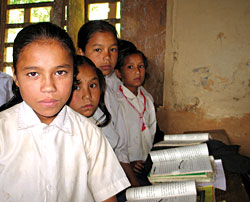|
|
At nine years old she was rough around the edges but raring to work, stepping up on a wooden stool to scrub dishes at the sink and burying herself under a mound of clothes that she would tote upstairs to dry on the rooftop. Despite prodding, Puja said little, speaking mostly with a smile that lit up her round face.
But the transition to her new life wasn't trouble-free, a few months after she arrived the house owners did a snap inspection of her bedroom and found a cache of soap, towels and other household items the girl had squirreled away to take home when she left. But as weeks and then months went by, the theft looked more and more like an isolated event and it soon became obvious that she was a favourite playmate of the infants who often crawled around the house.
The school session arrived and Puja donned a green uniform, stuffed books and other supplies into a backpack and headed out the door down to the main street to join the stream of other children chattering and walking to school. Her first day was intimidating-she was placed in kindergarten because she could barely read and write and when the teacher asked her real name she couldn't remember. She was dubbed 'Sanskriti'.
School seemed to boost the girl's confidence, she was now more likely to answer questions with a few quiet words, and she often sat outside with her books doing her homework. In no time her Nepali reading and writing surpassed that of a foreigner living in the next house and she would happily grab one of the Nepali newspapers lying around and begin reading aloud in front of him.
About a month ago one of Puja's relatives arrived with news that her mother was critically ill in hospital. Despite being eternally absent when most needed, her father had managed to return long enough to press his desire for a male child on his wife and she was about to give birth. The relative could give few other details but the situation was urgent so the girl was told to pack quickly and was sent away with some emergency money. As days went by we feared the worst: Puja's mother had died and that the girl, age 11, had become a mother to her baby brother.
The implications were all too obvious: without even a Class One education, there was little chance Puja would get a good job and strong odds that she would grow up to live a life much like her mother's. Surveys have shown that just one extra year of schooling beyond the average can boost a Nepali woman's earnings by 20 percent. An educated woman anywhere in the world, is 50 percent more likely to get her kids immunised against childhood diseases.
Puja had made it further than the 20 percent of Nepali children who are never enrolled in primary school but she couldn't even count herself among the 15 percent of school kids who drop out in Class One.
Then, about a week after Puja left, the gate to the house in Dili Bajar swung open and there she was, eight feet above, stretching on the branch of a tree to pick flowers for the puja room, flashing that full-toothed smile. Her mother had survived the birth and had decided to keep the girl's older sister at home and to return Puja to her place in the city. She left the emergency money behind to buy baby formula and caught the first bus back.
No, this was not the story I planned to tell-and I'm happy it turned out that way.




